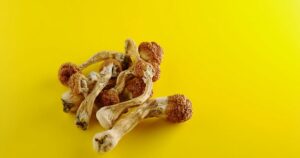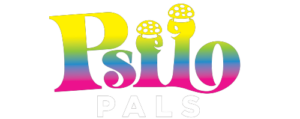Exploring the Mind-Body Connection: Psilocybin’s Impact on Anxiety and Wellness
- December 13, 2023
- 2:32 am

Notable Elements
Understanding Psilocybin: Psilocybin, found in magic mushrooms, is a psychedelic compound that converts into psilocin, affecting perception, mood, and cognition.
Therapeutic Potential in Mental Disorders: Research suggests promising effects of psilocybin in treating anxiety, depression, PTSD, and other mental disorders, offering an alternative to traditional treatments.
Mechanisms of Action: Psilocybin works by promoting neuroplasticity, activating serotonin receptors, altering mindset and perception, and reducing Default Mode Network activity.
Impact on Anxiety and Depression: Psilocybin has shown potential in reducing symptoms of anxiety and depression, offering a unique approach through altered states of consciousness and mindset shifts.
Legal and Safety Considerations: Psilocybin’s legal status varies; it’s crucial to understand local laws. It’s not suitable for individuals with certain mental health conditions, those on specific medications, or pregnant/breastfeeding women.
Changing Legal Landscape: Some regions are re-evaluating psilocybin’s legal status due to its therapeutic potential, with places like Oregon leading in legalizing psilocybin-assisted therapy.
Ongoing Research: While early studies are promising, more research is needed to fully understand psilocybin’s efficacy and safety in mental health treatment.
Consult Healthcare Professionals: It’s important to consult with healthcare professionals before considering psilocybin use, especially for individuals with mental health concerns.
Introduction
Psilocybin, a naturally occurring psychedelic compound found in certain species of mushrooms, has gained significant attention in recent years for its potential therapeutic effects on mental disorders and overall well-being.
This article aims to delve into the topic of psilocybin, exploring what it is, its potential benefits in mental disorders such as anxiety, its use in anxiety treatment, and the legal implications surrounding its use.
What is Psilocybin?
Psilocybin, also known as magic mushrooms or shrooms, is a naturally occurring psychedelic compound found in over 200 species of mushrooms. When ingested, psilocybin converts into psilocin, which triggers alterations in perception, mood, and cognition. For centuries, different cultures have used these mushrooms for rituals, spiritual experiences, and healing.

Does Psilocybin Help in Mental Disorders?
The therapeutic potential of psilocybin in mental disorders, particularly anxiety-related conditions, has become a subject of interest in recent years. Preliminary research suggests that psilocybin may hold promise in the treatment of mental disorders like anxiety, depression, and post-traumatic stress disorder (PTSD).
Anxiety disorders are among the most prevalent mental health conditions globally, affecting millions of people. Traditional treatment methods for anxiety, such as pharmaceutical medications and psychotherapy, often have limitations, including side effects and incomplete efficacy. It has led researchers and professionals to explore alternative options, including psilocybin-assisted therapy.
Can Magic Mushrooms Help in Anxiety and Disorders?
Research on the therapeutic potential of psilocybin for anxiety and other mental disorders is still in its early stages, but the results thus far are promising. Studies have shown that psilocybin-assisted therapy may be effective in reducing anxiety symptoms and providing long-lasting benefits.
One of the mechanisms through which psilocybin helps alleviate anxiety and related disorders is by modulating the serotonin receptor system. Serotonin is a feel-good neurotransmitter that plays a crucial role in regulating mood, sleep, and emotions. Psilocybin stimulates serotonin receptors, leading to increased serotonin levels in the brain, which can have a positive impact on anxiety and mood.
Moreover, psilocybin-assisted therapy induces a state of heightened introspection and self-reflection. This altered state of consciousness can help individuals explore and process deep-rooted emotional issues, traumas, and negative thought patterns that contribute to anxiety disorders. By addressing these underlying causes, psilocybin may offer a unique and potentially transformative approach to anxiety treatment.
- Depression: A study published in the Journal of Psychopharmacology found that psilocybin-assisted therapy led to significant reductions in depression symptoms in patients with treatment-resistant depression. The effect is sustained over a 3-month follow-up period.
- Anxiety: A randomized controlled trial conducted at New York University found that psilocybin-assisted therapy significantly reduced anxiety and depression in patients with advanced-stage cancer. The benefits persisted for up to 6 months.
- Addiction: Research published in the Journal of Psychopharmacology demonstrated that psilocybin-assisted therapy was effective in treating tobacco addiction. The study concluded that a single dose of psilocybin helped increase smoking cessation rates and reduced cravings.
- Obsessive-Compulsive Disorder (OCD): A study conducted by the University of Arizona found that psilocybin-assisted therapy reduced OCD symptoms in participants who had not responded to traditional treatments. The improvements were significant and persisted for up to 24 weeks.
- Post-Traumatic Stress Disorder (PTSD): A small-scale study published in the Journal of Psychopharmacology found that psilocybin-assisted therapy significantly reduced PTSD symptoms in veterans. The participants reported decreased anxiety, depression, and insomnia, as well as improved overall well-being.
**Noted- It is important to note that while these studies show promising results, more research is still needed to fully understand the potential benefits of psilocybin-assisted therapy for mental disorders.
Psilocybin treatment for Anxiety and Depression
Psilocybin, the active compound found in “magic mushrooms,” has shown promise in the treatment of both anxiety and depression. Here are some ways psilocybin impacts these mental health conditions:

- Neuroplasticity and Connectivity: Psilocybin promotes neuroplasticity, which refers to the brain’s ability to reorganize and form new neural connections. By increasing connectivity in certain areas, psilocybin may help individuals break free from rigid thought patterns associated with anxiety and depression.
- Serotonin Receptor Activation: Psilocybin activates serotonin receptors in the brain, particularly the 5-HT2A receptors. Serotonin plays a crucial role in mood regulation, and increased activation of these receptors may help alleviate symptoms of depression.
- Altered Perception and Mindset: Psilocybin can induce altered states of consciousness, altering perception and providing individuals with a fresh perspective on their anxieties and depressive symptoms. This shift in mindset may lead to profound insights and a sense of interconnectedness, which can reduce anxiety and promote a more positive outlook.
- Mystical Experience: Many individuals who undergo psilocybin-assisted therapy report having a mystical experience characterized by a sense of transcendence and a deep connection to something greater than themselves. These experiences are associated with long-lasting positive changes in mood, attitudes, and overall well-being.
- Decreased Default Mode Network (DMN) Activity: Psilocybin reduces the activity and connectivity of the DMN, which is a network associated with self-reflection, rumination, and negative self-thinking. By dampening the DMN, psilocybin may help individuals break free from repetitive negative thought patterns that contribute to anxiety and depression.
Who Should Not Take Psilocybin?
While research suggests potential benefits, psilocybin is not without risks and should not be taken lightly. Some individuals should refrain from using psilocybin due to various reasons, including:
- History of mental health conditions: Individuals with a history of severe mental illnesses, such as schizophrenia, bipolar disorder, or psychosis, should avoid psilocybin use, as it may worsen their symptoms or trigger a psychotic episode.
- Individuals on certain medications: Psilocybin can interact with certain medications, including antidepressants and mood stabilizers. Combined use can lead to adverse reactions or reduce the efficacy of prescription medication.
- Individuals with a family history of mental illness: Those with a family history of mental illnesses should approach psilocybin use with caution, as they may be at a higher risk of experiencing psychological effects.
- Pregnant or breastfeeding women: Due to the lack of research on the effects of psilocybin on developing fetuses or nursing infants, pregnant or breastfeeding women should avoid its use.
Consultation with a healthcare professional is crucial for anyone considering psilocybin use. They can assess specific circumstances and determine whether psilocybin is a suitable option.
Legal Implications:
The legal status of psilocybin varies across different countries and regions. In some places, it is classified as a controlled substance, while in others, it may have decriminalized or legalized status. It is vital to be aware of the legal implications before considering psilocybin use.
In recent years, some jurisdictions have implemented changes to policies surrounding psilocybin due to increasing evidence supporting its therapeutic potential. For example, in 2020, the state of Oregon in the United States voted to legalize psilocybin-assisted therapy for mental health treatment.
Nonetheless, it is essential to be informed about the legal landscape of psilocybin in precise locations to avoid any legal repercussions.
Also Read : Navigating the Legal Landscape: Magic Mushrooms and the Law
Conclusion:
The exploration of psilocybin’s impact on anxiety and wellness is an exciting field of research. While there is still much to learn about the compound’s therapeutic potential, early studies indicate its promise in helping individuals with anxiety and related mental disorders.
Consider potential risks and contraindications of psilocybin. Also, consulting with healthcare professionals and adhering to legal regulations is essential for safe and responsible use.
As research in this area progresses, it is believed that psilocybin-assisted therapy can provide novel and effective treatment options for those struggling with anxiety and other mental health conditions, ultimately enhancing the mind-body connection and promoting overall wellness.

Hi! I’m Jacob Hawthorne, a passionate medical student dedicated to exploring the fascinating world of psychedelics, particularly magic mushrooms (commonly known as shrooms). With a deep interest in their therapeutic potential and profound effects on the human mind, I aim to provide accurate and evidence-based information about shrooms in the Canadian context.
